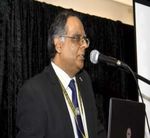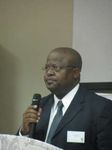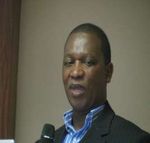Minister of Higher Education and Training Dr Blade Nzimande
←
→
Page content transcription
If your browser does not render page correctly, please read the page content below
IN THIS ISSUE MAY 2011
Minister Blade Nzimande launches the new SASCE
The Minister welcomes the new SASCE BOARD
The Ministers Speech
SASCE Board Members
SASCE Colloquium focuses on FET
Colloquium Speakers
SASCE establishes a full time Head Office
Picture Gallery on Website www.sasce.co.za
Minister of Higher Education and Training Dr Blade Nzimande
Launches the new SASCE and welcomes new SASCE Board members
Supports the move to professionalise Co-operative Education
Minister Dr Nzimande was the key-note speaker at the
Launch of the new SASCE.
The purpose of the Launch was to formalise that the
governance of SASCE would reside with a board of key
stakeholder representatives, including bodies such as
SAQA, HESA, SETA’s, BUSA, IPM, TELKOM including
business and labour representatives from commerce and
industry.
SASCE announced its intentions to move towards
becoming a Professional Body that would formalize
minimum standards, best practice and accreditation
criteria for work based learning partnerships, placements
and practice.
SASCE would have a permanent national office at the
Central Johannesburg College Campus in Parktown
Johannesburg to centralize operations and to co-
ordinate regional branch activities
Dr Blade Nzimande Minister of Higher Education and Training
The following are some highlights of the Ministers speech.
The launch of SASCE is very important and is aligned to the plans of the Ministry to increase placements of students in
industry for Work Integrated Learning purposes. He welcomed the intention of SASCE to become a professional body. He
indicated that it is high time that SASCE becomes a prestigious body and the facilitator of Work Integrated Learning activities in
South Africa. He highlighted the fact that SASCE is well positioned to take centre stage as the hub of bodies that have an
interest in Co-operative Education. He encouraged participation by other bodies in SASCE activities.
The Minister pledged his support and committed that the Ministry will be walking hand in hand in developments leading to
SASCE becoming a professional body and making the impact that is much needed around issues of Co-operative Education.
1Minister Dr Blade Nzimande Speech
It is a great pleasure to be here with you today and At the core of our skills shortages are the priority This represents a waste of resources for the
speak at this occasion of launching of the Board of skills areas of engineers, technologists and individual but for society as a whole, as the 2 -3
SASCE. Of course SASCE is not a new institution technicians because of their vital role in supporting years invested in academic programme is not
and I am pleased that it did not close shop when the massive infrastructure development turned into value.
the transformation that led to the transforming of programmes and large capital projects envisaged
Technikons into Universities of Technology. in South Africa. To give greater effect to this principle and ensure
greater employer participation, a PIVOTAL grant
I presume the decision was influenced by the The extent of these shortages is established in a has been incorporated into NSDS III. 10% of the
recognition that transformation does not take away number of research projects undertaken by mandatory grant will be dedicated towards this
the importance of integrated work place learning in various research bodies. But the shortage of initiative. Employers who provide workplace based
higher and further education and training, which is technicians and technologists is broader than in opportunities can supplement the cost of the
the key area of focus for SASCE. Despite the fact the area of engineering. There are technicians and programme with the grant from the SETAs. The
that we do not have Technikons any more in the technologists who support accountants, in the SETAs in turn are expected to ensure that 10% of
system, the need for work place learning exists health sector, in the security services, ICT, etc. in the mandatory grants are ring fenced to fund
even in the current institutions of learning. all the sectors, the concern is the same. workplace based training opportunities.
Allow me to be nostalgic. I do not want to get into But we are not producing enough of these I presume SASCE will have a role to play in the
the pros and cons of the transformation that professionals, and the transformation and shift that implementation of this principle and will think of
started in the late eighties which led to the has taken place in the higher education, in what kind of partnership to build in this area
Technikons shifting away and emulating the particular with regard to the focus drift and a shift
universities in their method of provision. But I want in the method of provision of Technikons had Over and above the requirement for the
to reflect on a few things that I think were contributed a lot to this. qualification, work place training provides an
significant and made them different from opportunity for entry into the labour market and
universities, but also was critical in the production One of the key areas of concern is that technicians provides young people with the necessary
of skilled technicians and technologies, amongst do not graduate to technologists. Furthermore only experience that is critical for accessing future
others. half the engineering graduates go on to register employment. It is for this reason that we also want
with the Engineering Council of South Africa to increase the participation in learnerships and
Technikons, amongst other things were good in (ECSA) as practicing professionals with a similar internships. And I am positive that, in partnership
building partnerships with industry because trend also noted with regard to technicians and with the SETAs, SASCE could play a critical role
perhaps the nature of their programmes in the technologists. This practice is also found in other in this area.
main had a work place learning component. But sectors, whereby technologists and technicians in
this partnership extended beyond this. There was the health sector for example work as consultants Having said the above, I would like to commend
an effort to ensure that the students, after for pharmaceutical companies. SASCE for reviving itself. SASCE already have a
completing the academic component had access relationship and partnerships with many
to workplace training and could therefore complete The creation of the department of higher education institutions and this will go a long way in assisting
their qualifications. It was very rare that there and training presents an opportunity to integrate us as the post-school community and ensure that
would be students who do not complete and further and higher education and training with we produce skilled and capable workforce for an
acquire a qualification because they could not get skills development and to take advantage of the inclusive growth path and social development.
work place training. available resources and effectively use them to
ensure that we improve the outcomes in respect to The department of higher education and training is
The partnerships extended beyond this as I producing a skilled and capable workforce for an in a process of structuring itself to ensure that we
indicated. My recollection is that professionals inclusive growth path. build an integrated, articulate and success driven
from industry were also an important component post school system. SASCE is in the process of
of teaching staff in the Technikons. Furthermore, In January this year, we launched the NSDS III restructuring itself to fit within the mandate of the
there was flexibility and part time study was one of which is meant to ensure that we address the department. As indicated, work integrated learning
the characteristics of provision in the Technikons. skills development challenges that face us as a is a critical component of the mandate of the
This allowed most full time employed technicians country. One of the key principles of the NSDS III department. As the two institutions structure and
to upgrade to technologists and to engineers is that we want to make work integrated learning a restructure themselves, we both need to think
through part time studies in the evenings. critical component of education and training. But about what partnerships do we build and what
this is not only a focus brought about by NSDS III, roles and responsibilities do we assign. This
We have lost most of these critical principles. it is a key principle that is part of the mandate of includes partnerships with institutions of learning,
Some of it still exists, but instead of building and the department of higher education and training. SETAs, other professional bodies, employers, and
strengthening what was there and up scaling it, we others.
There are a number of reasons for this. Although
seem to have regressed and less of this is
we do not have accurate statistics, we know that Thank you
happening. This has had negative consequences there is a significant number of learners who have Dr Blade Nzimande
and I would like to just touch on the resultant skills completed the academic programme from
shortages challenges. universities of technology and/or FET colleges,
and due to lack of the work place component of
the training, they are unable to qualify.
2Minister Blade Nzimande welcomes the new SASCE BOARD members
Dr Ronel Blom (HESA), Higher Education SA; Mr Kganki Matabane (BUSA) Business Unity South Africa
Mr Andile Sipengane (W&RSETA) Wholesale and Retail SETA; Ms Sharon Snell (INSETA) Insurance SETA;
Professor van Wyk, Assistant Principal at UNISA; Dr Blade Nzimande Minister of Higher Education and Training
Rre Elijah Litheko CEO of the Institute of People Management (IPM); Mr Sam Isaacs CEO of SAQA
Mrs Carole Hills, Group Training & Development Manager at Bell Equipment
Mr Brian Forbes Executive Officer of SASCE, Mr Shakeel Ori SASCE President, Mr Alpheus Maphosa SASCE Secretary
(The full list of confirmed Board Members follows below)
3SASCE BOARD MEMBERS
INSTITUTION NAME SURNAME DESIGNATION
1 HESA Ronel Dr Blom Research and Innovation
2 IPM Elijah Rre Litheko Chief Executive Officer
3 SAQA Samuel Isaacs Chief Executive Officer
4 NEHAWU Joe Mpisi 1ST Deputy President
5 BELL Equipment Carole Hills Group Training & Development Manager
6 W&RSeta Andile Sipengane Chief Officer: Research W&R Seta
7 NSA Thabo Mashongoane Name still to be officially confirmed
8 BUSA Kganki Matabane Executive Director
9 SANLAM Nasrat Edoo Sirkissoon Sanlam: Training Development Manager
10 SACCI Alwyn Prof Louw SACCI Board Member
11 TELKOM Thami Msubo Chief of Human Resources
12 HILTON HOTELS Kosi Reddy Human Resource Manager
13 AVUSA MEDIA Mary Papayya Name confirmation to follow
Including the EXECUTIVE COMMITTEE
DESIGNATION NAME SURNAME INSTITUTION
1 President Shakeel Ori Durban University of Technology
2 Vice President Prof Jane Spowart University of Johannesburg
3 Secretary Carver Pop Polytechnic of Namibia
4 Treasurer Thomas Mafate Central Johannesburg College
5 Past Vice-President Brian Forbes SASCE
5 Additional Member Esau Motaung Tshwane University of Technology
6 Additional Member Paul Tati Nkoka Training Institution
7 Additional Member Sam Tsima COMETSA
8 Additional Member Alpheus Maphosa Vaal University of Technology
9 Additional Member Mosima Makola University of South Africa
10 Additional Member Bennette Mokoma Central University of Technology
4COLLOQUIUM WITH THE THEME
PARTNERSHIPS – PLACEMENTS - PRACTICE
SASCE President Mr Shakeel Ori initiated the proposal to host a
Colloquium to coincide with the SASCE Launch.
The Colloquium focused primarily on FET Colleges to promote
appreciation and understanding of current skills legislation. UoT’s and
other university staff and industry also attended. The Programme included
topics covering;
NSDS III
The Role of SETA’s in the new education and training landscape
Impact on FET Colleges and UoTs
QCTO: Its role and scope
Workplace skills development initiatives
Scarce & Critical Skills
Co-operative Education (Work-integrated Learning)
Brian Forbes - part time Executive Officer of
SASCE set the tone for the Colloquium by
outlining the new SASCE trajectory in relation
to the theme of the Colloquium:
Partnerships – Placement - Practice
Through meaningful partnerships and for
SASCE to professionalize, co-operative
education will enhance the status of service
provision and will also positively impact on the
objectives of NSDS 111
Minimum standards, best practice and work-
place accreditation will underpin all aspects of
workplace and work integrated learning
implementation.
5Adrienne Bird Acting CEO of the QCTO clarified that the core Andile Sipengane of the W&RSETA outlined the goals of
mandate of the Quality Council for Trades and Occupations was NSDS III in the relation to the new SETAs landscape. He also
the design and quality assurance of Occupational Qualifications. clarified the guidelines and opportunities of Discretionary Grants,
Pivotal Grants and Catalytic Grants and the specific benefit for
She said she was excited about the launch of the new SASCE
work-integrated learning, scarce & critical skills as part of Co-
and saw SASCE as an important partner/player in the roll-out of operative Education
the QCTO
:
Mr Motsumi Makhene Principal of CJC explained that the Mr Boni Gantile Telkom HR Executive outlined Telkom's vision is
Centre for Employment and Entrepreneurship Development to be a leading customer and employee ICT solutions service
(CEED) renders services to students in the form of enterprise provider. The main role of Telkom Centre for Learning is to ensure
development and career support. These entail internships, that the Telkom personnel have the requisite skills to enable
setting up and supporting student business incubations and job delivery in line with Telkom's Human Resources strategy.
seeking skills 6SASCE HEAD OFFICE
The Central Johannesburg College has kindly offered to allow
SASCE to set up a full time National Office at their Parktown
Campus. The address is
No 5 Ubla Avenue
off Princess of Wales Terrace
Parktown
Gauteng
South Africa
This building also houses the College’s School of Employment and
Entrepreneurship Development.
Members of SASCE Executive outside the CJC Campus to visit
the Centre for Employment and Enterprise Development where
the SASCE Head Office will be located
(Left to Right)
Mr Thomas Mafate CJC Finance and ICT Head
Mr Sam Tsima SASCE Executive Member
Mr Alpheus Maphosa SASCE Secretary
Mr Motsumi Makhene Principal of CJC
7You can also read



























































